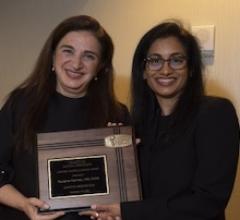
Dr. Anne Alexandrov. Image courtesy of the UT Health Science Center
February 15, 2024 — Research findings in a clinical trial led by a professor at the University of Tennessee Health Science Center’s College of Nursing are likely to dramatically change care and improve outcomes for patients suffering from acute stroke.
Principal investigator, Professor Anne Alexandrov, PhD, AG-ACNP-BC, RN, CCRN, ANVP-BC, NVRN-BC, FAAN, presented results of the five-year clinical trial titled, Zero-Degree Head Positioning in Acute Large Vessel Ischemic Stroke (ZODIAC), at the International Stroke Conference in Phoenix February 7. ZODIAC sought definitive results on the impact of head positioning on patients with large artery acute ischemic stroke prior to thrombectomy. A thrombectomy is a surgery to remove a blood clot from an artery or vein.
“Our conclusions are that acute large vessel occlusion (LVO) ischemic stroke patients that have viable brain that can be saved by thrombectomy should immediately be positioned with the head at 0 degrees to preserve brain function prior to the thrombectomy procedure,” Dr. Alexandrov said. “Ambulance and helicopter personnel need to know this, as well as all emergency department personnel. We expect that our findings will change patient care dramatically in this patient population.”
Since 1968, worsening of clinical symptoms has been documented in acute stroke patients when the head is positioned at 30 degrees or higher, while clinical improvement has been noted with 0 degree or supine positioning. But the question of whether head positioning at 0 degrees or 30 degrees in acute LVO patients matters prior to thrombectomy has never been explored.
The clinical trial was a multisite prospective randomized outcome blinded evaluation funded by $2.3 million from the National Institute of Nursing Research. The clinical trial enrolled 92 patients at 12 sites over five years, and the study was ended by the Data and Safety Monitoring Board on Nov. 1, 2023, due to the overwhelmingly positive results of 0-degree head positioning. A Data and Safety Monitoring Board is a committee of experts responsible for reviewing clinical trial data on an ongoing basis to ensure the safety of study subjects and validity and integrity of the data.
The clinical trial’s conclusion was that 0-degree head positioning is safe and imparts stability and clinical improvement in these patients prior to the thrombectomy, making head positioning an important rescue procedure, Dr. Alexandrov said. Use of 0-degree positioning may be one of the most important first steps in managing a LVO thrombectomy candidate.
All patients had a baseline National Institutes of Health Stroke Scale Score (NIHSS) taken immediately after completion of computed tomographic angiography scanning while still in the 0-degree position. The NIHSS score is a measure of neurologic disability from stroke. Patients were then randomized into one of the two groups: 0-degree head positioning and 30-degree head positioning. The patients underwent repeat NIHSS scoring every 10 minutes, with the final score determined by a certified practitioner who was unaware that the group was conducting research on head positioning.
The researchers found that head positioning at 0 degrees ensured a reduction of disability or clinical stability. They also found that for patients in the 30-degree group, one out of two deteriorated significantly.
The researchers also saw a positive impact of 0-degree head-positioning on patients after the thrombectomy. Twenty-four hours after the surgery, patients in the 0-degree group had significantly better improvement in neurological disability compared to the 30-degree group. The 0-degree group also had significant improvement in neurological disability compared to the 30-degree group seven days after the surgery or at discharge from the hospital – whichever came first.
Dr. Alexandrov is a recognized clinical expert in the areas of emergency and critical care with concentrations in neuroscience and vascular dynamics and is considered the leading international nursing expert in acute stroke management.
College of Nursing Dean Wendy Likes, PhD, DNSc, APRN-BC, FAANP, FAAN, said, “Dr. Alexandrov’s work is an amazing example of what nursing science is and the positive impact it has on health.”
For more information: https://www.uthsc.edu


 November 14, 2025
November 14, 2025 









